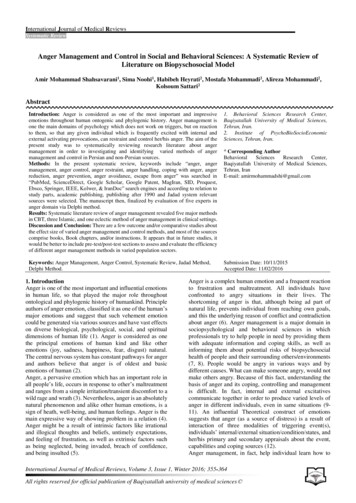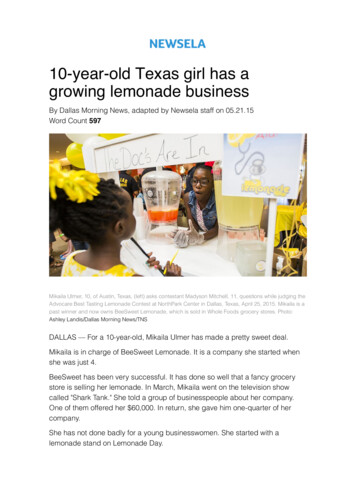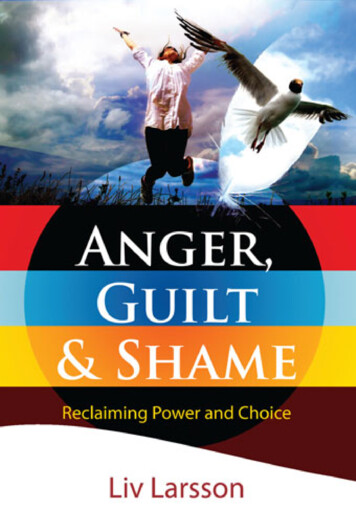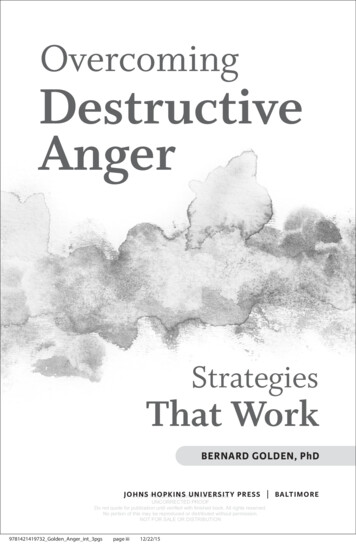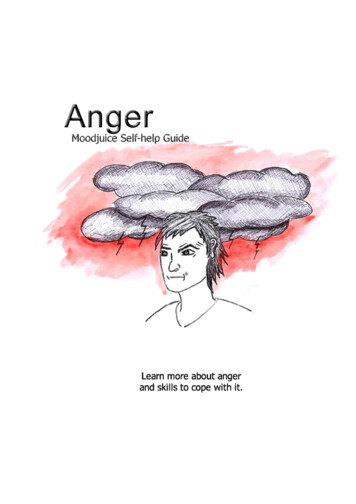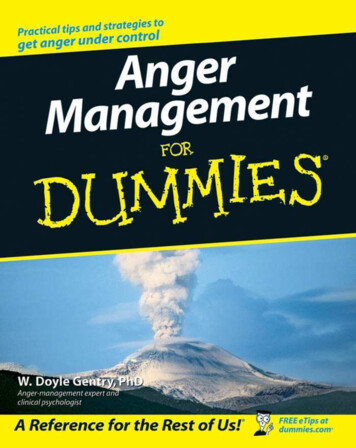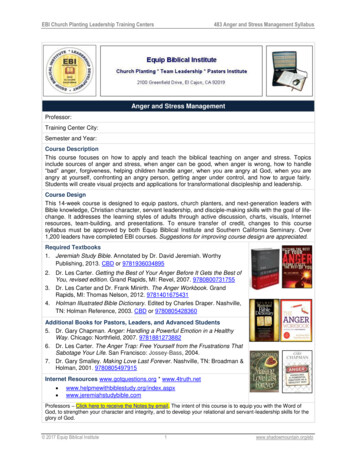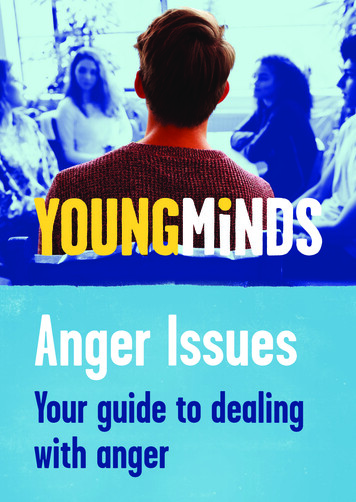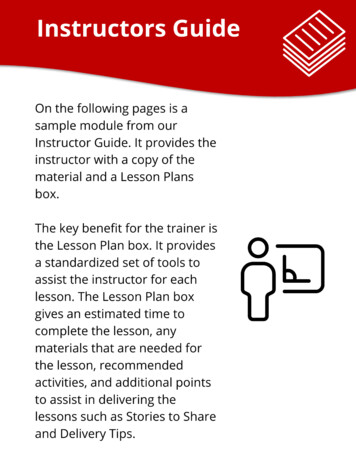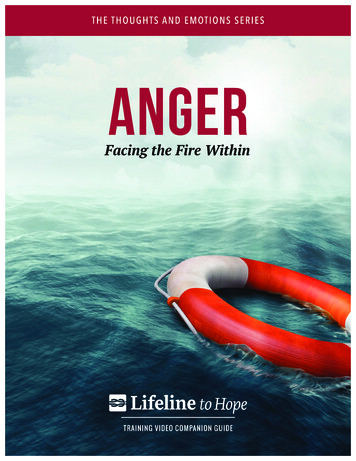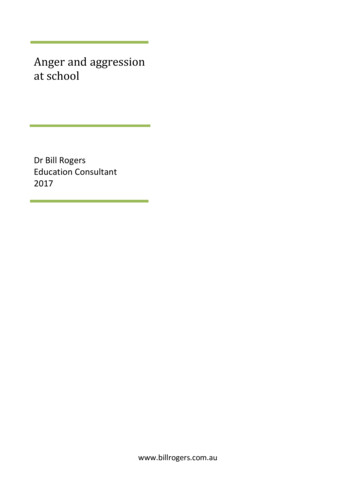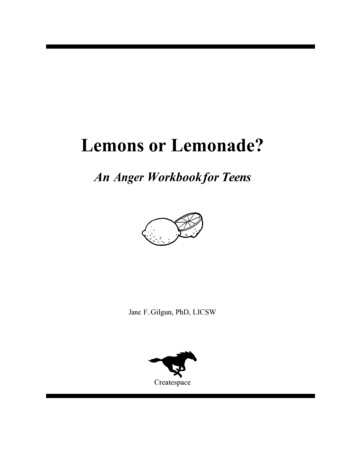
Transcription
Lemons or Lemonade?An Anger Workbook for TeensJane F. Gilgun, PhD, LICSWCreatespace
ALSO BY JANE GILGUNChildren’s BooksBusjacked!Emma and her Forever PersonFive Little Cygnets Cross the Bundoran RoadPatrick and the Magic MountainThe King’s ToastThe Little Pig Who Didn’t go to MarketThe Picking Flower GardenTurtle Night at Playa GrandeWill the Soccer StarBooksChild Sexual Abuse: From Harsh Realities to HopeChildren with Serious Conduct IssuesI Want to Show You: PoemsThe NEATS: A Child & Family AssessmentManualsLemons or Lemonade? An Anger Workbook for KidsLemons or Lemonade? A Manual for Professionals and Parents of KidsLemons or Lemonade? A Manual for Professionals and Parents of TeensReadiness to Adopt Children with Special NeedsJane Gilgun is a professor and writer. She has many articles and assessment tool available onsocial media websites such as scribd.com, Amazon Kindle, and smashwords.com.
Teens and AngerTeenagers get angry. Anger is normal and natural. Teens require the guidance ofadults to learn how to express their anger. That is the purpose of this workbook: to helpteens learn how to express their anger appropriately. By appropriately, I mean in waysthat foster open communication and do not harm others or the self. Parents andteachers will find the ideas and exercises in this book helpful. When teens and teachersfind that teens’ expressions of anger are too much for them, they may seek the help ofprofessionals. This workbook is made for anger management education for youngpeople 13 and older.I wrote this workbook and the manual for parents and professionals after yearsof work with families and young people. I saw over and over how angry and hurt manyyoung people are. Some anger issues are fairly easy to work with. Youth with easy towork with issues may be doing what they have seen others do. Helping young people toexpress anger appropriately involves direct instruction from adults as well as long-termrelationships with adults who handle their own anger appropriately. This is uncomplicated, simple anger that responds to gentle, yet firm instruction that spells out what isacceptable behavior and what is not.For some young people, anger is the tip of an iceberg. This is complex anger.Fear, hurt, frustration, unworthiness, a sense of being bad, and a desire to be on topcould be linked to expressions of anger. For teens with complex anger, some pretty badthings have happened, like abuse and neglect, witnessing violence against theirmothers, and other traumas such as war, car accidents, and forced migration. Anger isan expectable response to such adversities. Teens' anger in these circumstances areexpressions of many emotions and not only anger. They often find that how they expresstheir anger helps them feel better, but often these are temporary solutions that hurt theteens and sometimes hurt other people. Reactions such fighting, overeating, cutting,fighting, lying, stealing, and running away are examples. Some of the emotions thatunderlie anger and its expression can be hurt, humiliation, frustration, pride, andisolation. Many young people discover that they feel better when they bully others,torment animals, eat a lot, masturbate, or cut themselves. Even young teens smoke potand drink alcohol to sooth themselves.Parents and teachers may not know how to help young people who havecomplex anger. Some parents have experienced traumas similar to their teen’s. If theyare overwhelmed by their own issues, they are unable to comfort their teen and to teachand show their teen how to cope. Even if they deal fairly well with their own issues, theymay not know how to guide their teens to more appropriate expression of anger.Many teens think they are supposed to be aggressive when they are angry.They’ve learned this through watching how their parents and other adults express theiranger. Many teens think they are supposed to shout at others and hit others when they
are angry. They’ve seen their parents and other adults do this. Such behaviors seemnormal and natural. If these young people have experienced trauma, angermanagement is part of a program that teens and their parents require to deal withtrauma and their responses to trauma.Here’s an example. A 13 year-old boy didn’t start trouble but, when he feltprovoked, he attacked. The teachers said he was a good kid who wanted to do well inschool, but he couldn’t learn to read. He was frustrated about that. The school socialworker knew the boy well. He lived with a mother who drank to drunkenness every day.She had a younger son whom the boy thought she favored. Whenever she felt angertoward her older son, she beat him. He never hit her back. She yelled at him, made funof the size of his penis, and neglected him. One night, he phoned the police for helpwhen his mother beat him. They arrived right away and took him to the hospital wherehe stayed overnight. He told the nurses he did not want to go back home. He wantedfoster care. His mother said she did not want him home. After two nights in a shelter,child protection returned him to his mother’s house. Three days later, she beat himagain. He did not call the police. He left the house and walked the streets all nightsmoking weed.This young person would benefit from the exercises in this workbook that is partof a program that includes family and trauma-focused therapy and education abouttrauma, emotions, and relationships. He is a good candidate for tutoring and vocationaltraining where reading skills are not essential. His mother would be difficult to engage intreatment. As long as she is aggressive toward him and neglects him, this boy willcontinue to have difficulties. If young people are to learn to manage their emotions andbehaviors and live happy lives, their parents must change their own behaviors and showthem how to live well.Part of learning to cope with trauma related to parental aggression is developingskills to cope with powerful emotions related to rejection and fear. Using this workbookwhen family issues go unaddressed may be helpful but would be most effective in aprogram of treatment that includes trauma-focused family therapy and parental change.Some young people value gang membership. Gangs offer belonging and asense of family that all persons want. Unfortunately, gangs sometimes get what theywant through aggression and violence. Guiding gang members away from violenceinvolves acknowledging the importance of being part of a group while showingalternatives to violence. In other words, what young people want from gangs may bewhat most people want: respect, a sense of belonging, and a purpose in life.Acknowledging the sources of teens' discontent, identifying how teens currentlydeal with their discontent, and guiding them toward attaining their goals withouthurting themselves or others are goals of this workbook.Young people can learn to express their anger in ways that fostercommunication and that do not harm themselves or others. This workbook guidesteen's anger toward constructive expressions that turn the lemons of adversity intolemonade.Jane F. Gilgun, PhD, LICSWMinneapolis, Minnesota, USAAugust 30, 2012
Using this WorkbookFor TeensAnger is an important emotion. It fosters communication and builds relationships whenexpressed appropriately. What counts is what you do when you are angry. Theexercises in this workbook will show you how to express anger so that you will feelbetter and you will not hurt others or yourself. Many of the things in this workbook willhelp you build skills that you can use to make a good future for yourself and your familyand friends.For ProfessionalsFor maximum benefits, professionals would use this workbook in the course of work withyouth and their families. Doing the exercises in groups with youth and then having theyouth show their parents what they have done in the group that day is an effectiveapproach. Work with individual youth would also be effective, especially when parentsare involved. If parents or other adults who have a long-term presence in youth’s livesare unavailable, teens will still benefit from this workbook, but some of the potentialgains may be offset by lack of parental support.Allow each youth to go through the notebook at her and his own pace. Encourage youthto share their thinking and any material they develop. Some youth may want to act outscenarios they discuss. Some young people may want to hold back a bit from sharing.Please respect their wishes. A ground rule that often works is “You don’t have to shareanything they do not want to share.” Also let them know about your duty to report andyour duty to warn. Give them examples of the kinds of behaviors you are required toreport. Also, let them know they have a 5th amendment right not to incriminatethemselves and so they do not have to give details of any unlawful behaviors.For ParentsParents could this material with their teenagers and with younger children as well, whenthe anger issues are simple and not complex. In addition, parents must know how tomanage their own anger constructively. When children have complex anger—that is,anger that is connected to hurt, sadness, frustration, self-hatred, and worthlessness—then parents and young people require professional guidance.Some youth may not want to talk to you about their anger. Tell them you will be readywhen they are and that you will stand by them no matter what. If they have broken thelaw, they have to take the consequences, but you will be there for them while wantingthem to be accountable. Overall, be sure to provide them with love and guidance whileat the same time setting firm and consistent limits.Parents who are raising children who have issues with expressions of anger—such asaggression, depression, and self harmful behaviors—can use support from professionals and other parents whose children have similar issues. Seek that support.
Contents1 Reasons to be Angry12 Do You Deserve it?43 Do Other Teens Deserve it?54 People I Respect75 Respect86 What Do You Do When You are Angry?97 Anger is Like a Sour Lemon Taste118 Doing Things to Feel Better129 Feeling Better.for a Little While1310 The Endless Circle1411 Making Lemonade1512 Adults I Can Talk to2313 Lemons or Lemonade?2414 Your Turn2515 The Making Lemonade Checklist26Doing Something Really Well27Further Reading28About the Author29
Reasons to be AngrySome teens have lots of reasons to be angry. Bad things happen togood kids. Put a check mark in front of the things that have happened to you.Some of these things might not be happening now, but check them if they have everhappened, even once.Other people don’t like you.Other people make fun of you.Other people don’t respect you.Things that go wrong are your fault.You don’t live with your family.You are ashamed of where you liveYou don't feel like you belong.You feel like no one cares what you think.Other people pick on you.Your mother gets high on drugs.Your father gets high on drugs.Your mother gets drunk.Your father gets drunk.You are ashamed of your mother.You are ashamed of your father.You saw someone get hurt.You don’t feel safe at home.You don’t feel safe at school.You don’t feel safe in your neighborhood.1
Someone you love doesn't love you.You’re not welcome in some neighborhoods.Your father hits your mother or someone else.Your mother hits your father or someoneelse.Your brother or sister makes fun of you.Someone makes you do sexual things.You feel bad about something you did.You can’t read like the other teens.You can’t do math like the other teens.You’re not good in sports.You get yelled at.Someone hits you or beats you up.Someone you loved died.Other people steal your things.You miss friends when you move.A pet died.You move a lot.You think you're ugly.You don't have any friends.You feel unwanted.How many did you check?Do the things you checked make you angry?Do the things you checked make you sad?Do the things you checked make you angry and sad?2YesYesYesNoNoNo
Feeling Angry & SadTeens feel angry about these things. They feelsad, too. Sometimes they have a burning feeling inside.Sometimes they go from feeling angry to feeling sad tohaving that burning feeling. Right now you may be feelingsad or angry or both. You might have that burning feelinginside, too. This is not much fun.You can use this space for anything you want. Have things happened to youthat are on this list? Not on this list? You can write about them. You can draw apicture about them, or you can look around to see if there is an adult you can talk to.My Space3
Do You Deserve it?Teens sometimes believe they did something to deserve bad things. Someteens think they are bad when other people treat them bad. Here are things thatsome teens think. Circle yes or no to the following questions. I do bad things.I think I’m bad.Other people tell me I’m bad.Sometimes I think I am bad but no one has told me I am bad.I like being bad.Bad things happen to me because I’m a bad kid.If I had been a better kid, bad things would not have happenedYesYesYesYesYesYesYesNoNoNoNoNoNoNoIf you think you are bad . even sometimes,what is that like?Use the space below to draw a picture or write about what it’s like to think you arebad. If you think it’s good to be bad, you could draw a picture about that or writesomething. You can also leave this space blank.4
Do Other Kids Deserve it?Teens sometimes believe that some people deserve to be treated bad.Circle yes or no to the following questions. Some teens deserve to be beaten up.Some kinds deserve to be teased.I can take things from others teens if I want them.It’s okay to tease teens I don’t like.It’s okay to tease teens who are ugly.It’s okay to do mean things to other teens if I enjoy it.It’s okay to trick other teens into doing things.It’s okay to lie to get other teens to do things.It’s okay to force other teens to do things.Teens deserve it when other people are mean to them.It’s okay to make other teens cry if I think they are oNoNoNoNoWhat other things do teens do that make others feel bad or sad? Write them below.What I ThinkTeens have opinions about good and bad things in their lives. Check the itemsbelow that you agree with.Bad things can happen to good kids.Good kids sometimes do bad things.If someone does bad things to me, I want them to stop.It is wrong to do bad things to other people.It takes courage to talk to someone about what’s bothering you.5
What I ThinkYou probably have other opinions about these things. Use the spacebelow to express them. Write, draw, use watercolor, pastels, or write a poem.Do what you want with this blank page.My Space6
People I RespectYou probably respect some people. Think of who they are. Then answer the followingquestions. If you don't know anyone you respect, then skip to the next page.Who are the people you respect?How do the people you respect treat other people?How do they treat you?What do these people do when they are disrespected?What do these people respect about you?What do you do to get their respect?How do you know these people respect you?7
RespectTeens want respect. It's one of the best feelings in the world. Disrespectis a big reason why teens get angry. Circle yes, no, or maybe to the followingstatements.Respect means recognition for the thing you can do.YesNoMaybeMost teens get angry when they don’t feel respected.YesNoMaybeMost teens feel hurt when they don’t get respect.YesNoMaybeRespect means having friend who admire me.YesNoMaybeIt’s lame to want respect.YesNoMaybeEveryone wants respect.YesNoMaybeWhen I’m not respected, I get mad.YesNoMaybeI get back at people who don’t respect me.YesNoMaybeThe bigger hit of drugs I take, the more others respect me.YesNoMaybeWhen I’m disrespected, I feel like I’m no good.YesNoMaybeTeens who have nice clothes and fancy cars get respect.YesNoMaybeI have to have money to get respect.YesNoMaybeHaving a kid or two gets me respect.YesNoMaybeMaking people afraid of me gets me respect.YesNoMaybeReal men get respect.YesNoMaybePeople won’t respect me if I don’t have nice clothes, a car, & cash. YesNoMaybeBeing good at sex gets respect.YesNoMaybeHaving a baby daddy or a sugar mamma gets me respect.YesNoMaybeNot taking nothing from nobody gets me respect.YesNoMaybeOther things are more important than respect.YesNoMaybeSelf-respect is not important.YesNoMaybe8
What Do You DoWhen You are Angry?What do you do when you are angry? Here are some things teens do. Put acheck mark beside the things you do when you are angry or sad.You think no one respects you.You beat someone up.You don't talk.You pretend everything is okay.You think about something that makes you happy.You pick on other teens.You talk to someone.You listen to music.You do yoga.You hurt animals.You annoy other people.You destroy other people's property.You think about hurting other people.You do something nice for someone else.You set fires.You cut yourself.You steal.You sniff glue, paint, gasoline, smoke dope, take drugs, or drink alcohol.You read a book.You feel you are watching yourself from far away.You draw pictures about things that make you angry.9
You think about getting back at the person who madeyou angry.You think about running away.You run away.You work hard at something, like school work.You do sexual things to yourself.You do sexual things to others.You eat a lot of food.You throw up after you eat a lot of food.You cut yourself.You do things to make other people mad at you.You refuse to do what other people tell you to do, like teachers who want you todo your homework or parents who want you to come in at night.You tell jokes.You talk big.You write poetry.I talk trash about people behind their backs.Something else? What?How many items did you check?How many of these things don’t hurt anyone else or yourself?How many make things better?There's nothing wrong with being upset and angry. You have reasons to beangry if you feel disrespected, if someone beats you up or talks trash to you, if yourparents ignore you, if someone yells at you, makes fun of you, if you feel you don'tbelong anywhere, if you have been sexually abused, and if no one cares what youwant. What's important is what you do when you are angry and upset.10
Anger is Likea Sour Lemon TasteFor lots of teens, anger is like a sour lemon taste in your mouth. If you don't dosomething that helps it go away, anger can grow. It can burn. When you are angry, youcan do things that hurt yourself or others. First, we’ll talk about what anger can feellike. Then we’ll talk about how you can deal with your anger so you don’t hurt otherpeople or yourself. Anger is normal and natural. It’s what you do with it that counts.For some teens, Anger can be sour. It can hurt. It can make you feel helpless. It can make you feeldesperate. Anger can become like a great big lemon growing inside you. It gets so huge youfeel as if you are going to explode. It’s like someone stuffs a lemon in your mouth and the seeds go up your nose. It's like someone straps a huge basket of lemons on your back and you feel as ifyour back is going to break. You do everything you can to get that heavy burden offyour back. It's like you’re on fire inside. Anger can mean you’re a bad kid. You may think other people are laughing at youor don’t care about you. When you're angry, you may think about getting back at other people. This is calledrevenge.11
Doing Things to MakeYourself Feel BetterAnger doesn’t feel very good. It’s natural to want to do something to feel better.Some of these things teens do help the anger go away. Some of these things make theanger grow.Complete the sentences below.When I'm angry, I want toWhen I'm angry, I think aboutWhen I'm angry, I think I'm aWhen I'm angry, I feel like12
Feeling Better.for a Little WhileTeens do lots of things to makethemselves feel better when they areangry. Sometimes what teens do makesthings better. Sometimes what they do makes things worse. What makes things worseis to hurt other people or yourself. What teens did to feel better end up making themfeel worse.Teens may pick on other teens, steal, destroy property, fight with other teens,run away, set fires, drink, use drugs, do sexual things, eat too much, and cutthemselves. And you know what? Teens do feel better when they do these things.fora little while. Some teens feel terrific when they do these things.for a little while.Good Feelings that Turn BadThese good feelings don't last. In a little while, you start feeling bad again.Sometimes you are ashamed of what you did. Sometimes you feel guilty for what youdid. You think about the people you hurt. You're sorry you hurt other people.Do you ever feel sorry for hurting other people? Yes No13
The Endless CircleSometimes, doing something to make yourself feel better does make you feel better at first.Then you start feeling bad about what you did to feel better. Maybe you realize that you hurtsomeone else or yourself to feel better. It did seem like fun at the time. So, you do something else tomake yourself feel better. This something else hurts other people or yourself. Then you feel bad forwhat you did to make yourself feel better.Does it make sense to do things that make you feel badeven if they make you feel good at first?YesNoIt gets to be like a big circle. You feel bad. You want to feel better. You dosomething to feel better. You feel better at first. Then you realize that you hurtsomeone else or yourself. You feel bad about that. You want to feel better. You dosomething to feel better. You feel better at first. Then you feel bad because you hurtsomeone else or yourself.It's like the hamster in the wire wheel. Around and around you go. You can'tjump off the wire wheel.You're stuck, like a car stuck in sand. The wheels go around and around, butthe car doesn't go anywhere. The sand flies right in your face, and you can't get out ofthe way. Have you ever felt like a hamster stuck in a wire wheel? Have you ever felt like car stuck in sand?YesYesWhat do you do when you feel this way?14NoNo
Making LemonadeYou know what? You can make lemonade out of the lemons of anger. Thinkof how lemonade tastes on a hot day. Your throat is dry and maybe even a littlesore. You bring the glass to your mouth. The flecks of lemon slide over your tongue.The lemonade fills your mouth and slides down your throat. You finish the lemonadeand say, “Ah. It tastes so good.”There are things you can do that will make lemonade out of the lemons ofanger. These things won't make you feel ashamed or guilty afterward. You won't get introuble if you do them. You will feel good about yourself. Other people will respectyou.The sour lemon taste of anger will turn to the sweet taste of doing somethinggood. You will feel good about being you, maybe not at first, but after a while you will.When you do them, you won't hurt other people. You will not hurt yourself.When you do them, the good feelings will last.You may even feel proud that you did them. You will make lemonade out of thelemons of anger.Making lemonade out of lemons can be hard work. At first, it might not seemlike fun. Keep at it. You will be rewarded!It's important to want to.Maybe you don’t want to. Think about that.15
Making LemonadeThese are some things you can do to feel better, if you want to. Pick the onesyou want to do. Some may be better for younger teens, and some may be better forolder teens.The more you do things that make you feel betterand that don't hurt yourself or others, the more you will wanttodo them.Draw a picture of something that makes you angry. Use thedarkest, angriest colors you can find. Draw monsters,or anything you want that shows how angry you are.You might even make a story out of pictures.Did things turn out the way you wanted?Draw a picture of something that makesyou happy. Suppose you'd like to ride a horse. Draw a picture of a horse you'dlike to ride. Maybe you'd like to ride a flying horse, or a unicorn. You could alsodraw pictures that tell a story of something you want.Make up a story. Think up a story about a teen who is angry aboutsomething. What made the teen angry? Does anyone else care that the teen is angry?What is the teen feeling? What is the teen thinking? What does the teen want to do?What does the teen do? What happens when the teen takes action? Did the teen talkto anyone about being angry? Write a story as many times as you want. Have the teenhave different feelings. Have the teen take different actions. Tell someone else thestory if you want to. Make a video of it and post it on YouTube.16
Write a story or poem about a time you were angry. What happened tomake you angry? Did anyone else care? How did you feel? What did you think? Didother people tell you what to do with your anger? What did you do? What happenedafterward? Did things turn out the way you wanted them to? Tell the story to someoneelse if you want to. Maybe you can turn the story or poem into a video and post it onYouTube.Write a song about being angry. It could be about you or aboutsomeone else. Say whatever you want. Sing the song to someone else if you want to.Learn to play a musical instrument. Talk to your music teacher aboutthis. Or you may know people who play instruments. Talk to them about how you couldlearn to play, too.Throw a rubber ball against the garage. Find a rubber ball or tennisballs and throw them as hard as you can against the side of a garage. Make surethere's no one around whom you could hit. Pretend the person you're angry at isthere. Yell at the person every time you throw the ball.Maybe you could tack a target on the wall. See how many times you hit thebull's eye. Pretty soon you will have a good throwing arm for baseball.Pretty soon you will have a good throwing arm for baseball.Run. Put your running shoes on and run. Run until your chest and legs ache.Run wherever t's okay to run, like sidewalks, along a trail, or a track. Each time yourfoot hits the ground, say, "I am angry." Say whatever else you want to say, but keep onrunning. Other teens will think you are practicing for track. Pretty soon you mightwant to race other teens or try out for the track team.17
Kick a soccer ball around.Take a soccer ball to a field or a park.Kick that soccer ball as hard and as faras you want. Yell as loud as you wantabout how angry you are. You also mightget pretty good at soccer.Dig holes in the backyard.Ask your parents where in the back yard you candig. Using a shovel, dig as many holes as you want.Dig as deep as you want. When you are finished, shovelthe dirt back into the holes. Start all over again.You may end up with a freshly dug garden.Plant seeds in your new garden. Water them.Watch them grow. If you planted flower seeds, give your flowersaway. If you planted vegetables, give them to other people, too.Listen to music. Find music that helps youthink of the good things about your life. Some songs are funny.Sometimes they talk about things that are fun to do, like swingingon swings, walking in the woods, playing with other teens. Find that kindof music and get your mind off what is making you angry.Dance to music. Sometimes dancing to music will help you think abouthappier things. Move around. Shake your body. Move your hands and feet to themusic."I'm a good person who sometimes makes mistakes."18
Do yoga or meditate. Sometimes there are classes for teens on yoga andmeditation. These are great ways to relax and feel good.Substitute good thoughts for bad. Whenever you start thinkingthings like I’m bad" substitute, "I'm a good person who sometimes makes mistakes."Ask questions. If you think you are a bad person because of what someoneelse has done to you, find someone to talk to about this. Ask them, “Do you think I’m abad person?” Tell them about the times you think you are a bad person.Write in a diary. A diary is a place for special thoughts. When you're feelingangry, a diary is a good place to express it. You could draw pictures that show howyou feel. You could cut out pictures from magazines and paste them in your diary.You could tell stories in pictures or in words or both. Sometimes you might want towrite in your diary when you are not angry but are feeling good.Read a joke book. Go to the library and ask the librarian where the teens'joke books are. Read the jokes alone or with a friend, whatever you want.Read them out loud to yourself if you want to. Laugh as loud as you want. Youmight ask your teacher if you could tell a few jokes to the class. Other books thatare not joke books are fun to read, too.Have a pretend conversation with someone who isn't there. It could beyour father. Or your mother. Or your favorite aunt who died. Find a picture of thatperson. If you don't have a picture, you could draw one. Then, pretend the pictureis the person. Talk to the picture. Maybe you want to tell the person something thatmakes you angry. You might want to tell a funny story.You might want to pretend you are the person you want to talk to. It could belike a game that goes like this. First, move two chairs to face each other. Then, sit inone chair and be yourself. Pretend the other person is in the other chair.After you have said what you want to say, sit in the other chair. Pretend youare the person you just talked to. Give an answer to whatever you just said as if youare now that person. Then, you can switch back to the other chair and be yourselfagain and say something. Keep doing this until you want to stop.19
Find a friend to be with. Sometimes when you're feeling angry, justbeing with people you like can help you feel better. Visit them, or call them on thephone. You might tell them about your anger or you could ask them how theirday is going.Talk to someone you trust. Be on the lookout for someone you can talkto. Some teens watch another person for a long time before they decide they
professionals. This workbook is made for anger management education for young people 13 and older. I wrote this workbook and the manual for parents and professionals after years of work with families and young people. I saw over and over how angry and hurt many young people are. Some anger
